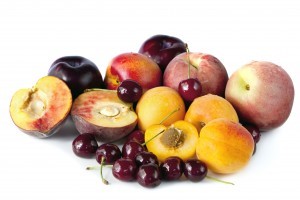Forbidden Fruit in the Spring Allergy Season

I saw several youngsters this past week in my office, ages 5 to 13, really getting pounded with allergies. One boy’s face was swollen and his eyes were red and tearing. Another girl couldn’t stop sneezing and her nose was bleeding from constantly blowing “to get out the snot” as she put it. Another boy said his throat was itching him a lot, and he wished he could reach down his throat to scratch it. I think you get the picture: it was a tough week if you are allergic to tree pollen.
Birch & Fruit Connection
Pollen-1.jpg
The tree pollen counts have been extremely high this past week according to local pollen reports. One particular tree pollen, Birch, not only causes nasal, eye and chest symptoms like other pollen but this pollen causes food allergies if a person eats certain fruits.
How so?
The boy who wanted to “scratch the back of his throat” mentioned this happened whenever he was eating an apple. He didn’t understand because if he ate an apple in the winter this didn’t happen. Another girl loved to eat cherries, as well as peaches and plums–these foods also made her throat itch, but nothing worse than that seems to occur. The parents of these children were concerned because they had always heard that food allergies could be quite dangerous, but fruits are so healthy for kids. Should they avoid them just because of some itching?
The Oral Allergy Syndrome
These children all had what is termed Oral Allergy Syndrome. It is a type of food allergy (often quite mild) that is related to a person’s pollen allergy. Children and adults who are allergic to birch pollen can have this allergy to fruits that have a genetic linkage to the Birch pollen. These fruits include apples, cherries, kiwis, plums and peaches–the so-called pitted or stone fruits. Also, vegetables such as carrots and celery are also included in this cross-reactive food allergy. Hazelnuts and soy products have been associated with Birch pollen allergy too. The proteins in these foods, specifically termed Betv1, is what causes the allergic reaction.
What You Can Do…

Although patients are disappointed they can’t eat these foods without symptoms, I do tell them that they can get away with eating these fruits or vegetables cooked. For example, most of the patients can eat an apple or cherry pie without a problem. The cooking process breaks down this protein easily and the protein is no longer allergenic. It is important to differentiate the Oral Allergy Syndrome from a more severe type of allergy. I can do this in my office by ordering a special new allergy component test that breaks down the different proteins to see which the dangerous and safer ones are.
Another interesting cross-reaction, but this time to grass pollen, is wheat. Again, this pollen and this food share some homologous (genetic) proteins that can make someone react to eating wheat products, such as rye bread, during the grass pollen season. Peanuts also cross-react with grass pollen, but many times this shows up more frequently on allergy testing than in real life. I mention this because sometimes I have patients come to me with their parents who are told their child is allergic to peanuts, but they have consumed peanuts without a reaction. Certain proteins in the grass pollen also cross-react with the peanut proteins and in essence, give a false positive. This can be very important to differentiate, as a child doesn’t want to be under all the restrictions of a true peanut allergy patient. Again, special allergy testing can identify true peanut-allergic patients from less dangerous reactions.
I want to wish all the mothers out there a wonderful Mother’s Day. And if you do have the Oral Allergy Syndrome, you can tell your family Dr. Mitchell said you can have the apple pie — a la mode for Mother’s Day!
Dr. Dean Mitchell
Mitchell Medical Group, NYC & Long Island
